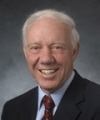Bigger D.C. Power Broker: Jim Oberstar or David Obey?

The Upper Midwest is home to a disproportionate amount of power when it comes to its Representatives in the U.S. House. Three of the twenty-one House Committee chairs hail from Minnesota and Wisconsin, with two of those, DFL Congressmen Jim Oberstar (MN-08) and Democratic Congressman David Obey (WI-07) each being one of the most storied politicians in their respective state’s history. (The third chair, Collin Peterson (MN-07), heads the Agriculture Committee).
The two Congressmen share many similarities, the most notable of which is that Oberstar is the longest-serving member of either house of Congress in Minnesota history (now completing his 17th term) and Obey the longest-serving member of either house of Congress in Wisconsin state history (now completing his 20th term).
Obey, currently the third longest-serving Congressman in the U.S. House overall, came to D.C. at the beginning of the Richard Nixon administration in a special election in April 1969, while Oberstar came to power just after Nixon’s resignation in the November 1974 general election.
Both Congressmen have coasted to re-election in almost all of their campaigns: Oberstar by an average margin of 45 points and Obey by an average margin of 29.5 points. Obey and Oberstar have been rumored to potentially retire in recent years, but still continue to win re-election by comfortable double-digit margins (although Obey’s 21.6-point victory in 2008 over Dan Mielke is the closest re-election margin he has faced in his career aside from Republican Scott West’s three-time attempt to unseat the Congressman in 1994 (8.7 points), 1996 (14.1 points), and 1998 (21.3 points)).
Both Congressmen represent northern districts of their state, which happen to border each other: Obey from northwestern Wisconsin and Obertar from northeastern Minnesota.
The Representatives are well known power brokers in D.C. – each serving on two of the most important Committees on Capitol Hill: Oberstar serves as Chairman of the House Committee on Transportation and Infrastructure and Obey is Chairman and serves as a member of all twelve House Appropriations Subcommittees. (Obey is the only Democratic member of the House to have served on the three major economic committees in the Congress: the Budget Committee, the Joint Economic Committee, and the Committee on Appropriations).
Each Representative serves large rural areas, and (perhaps as a result) neither Democrat is on the far left end of the ideological spectrum in Washington (with Oberstar being the more conservative of the two). National Journal ranked Obey the 85th most liberal Representative based on his 2007 voting record, with a composite liberal score of 80.3 (meaning, Obey was more liberal than 80.3 percent of his House colleagues on key votes during 2007). Obertstar ranked as the 149th most liberal member of the House, with a composite score of just 67.7. Oberstar is well known for displaying conservative credentials on social issues such as abortion (Oberstar voted, for example, against expanding research to more embryonic stem cell lines, against allowing human embryonic stem cell research, for restricting interstate transport of minors to get abortions, for banning partial birth abortion, and for banning family planning information in U.S. aid abroad).
In Knowlegis’ 2007 Congressional power rankings, Obey came in at #5 while Oberstar ranked #28 (both atop their respective state’s U.S. House delegation). Obey was ranked #9 in 2005 and #26 in 2006. Oberstar’s ascendancy to the Chairmanship of the Transportation Committee with the Democratic takeover of the U.S. House significantly boosted his ratings (rising from #165 in 2005 and #125 in 2006). Oberstar had brought in more than $90 million in earmarks while Obey topped $102 million.
Given the Democratic advantage in the U.S. House, retirement seems to be the only way either of these Congressmen will lose their powerful Chairmanships or seats in Congress in the near future.

